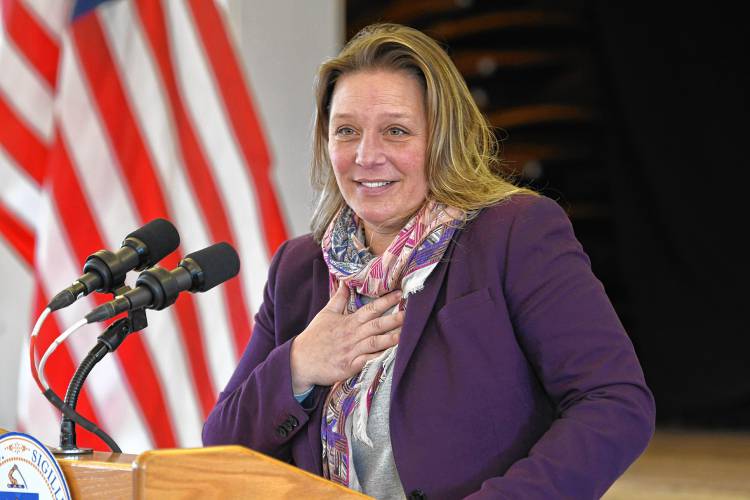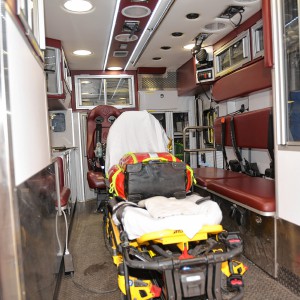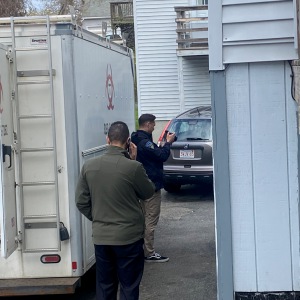Blais, Comerford pitch new building authority to aid towns
| Published: 09-28-2023 5:58 PM |
In Conway, fire engines need to be retrofitted and parked bumper to bumper to fit into the garage. Ashfield’s police chief has a single office space in the basement and an emergency exit she can’t use. And in Royalston, the town cannot move to bigger offices because a federal agency constructed a building with lead and asbestos.
The common thread tying these stories together is simple: money. Small towns, like Conway, Ashfield and Royalston, often take years to save enough money to fund public safety complex or municipal building projects.
New bills filed by Rep. Natalie Blais, D-Deerfield, and Sen. Jo Comerford, D-Northampton, are seeking to open up new avenues to assist towns in paying for these developments by establishing a municipal and public safety building authority similar to the Massachusetts School Building Authority or the Board of Library Commissioners’ grant program.
“It’s the same idea; the state recognized those were important and what we’re saying is, ‘This is important.’ It can’t be fiscally impossible to run a town,” Comerford said in a phone interview, adding that communities in this part of the state typically “do not have the ability to update, renovate or build new municipal infrastructure, and that’s in large part, frankly, due to the scale of our towns.”
A public hearing for An Act Creating a Municipal and Public Safety Building Authority, filed as bills H.3802 and S.1489, was held on Sept. 13 and featured testimony from several Franklin County and North Quabbin officials, including Ashfield Police Chief Beth Bezio and Royalston Selectboard Chair Deb D’Amico, who shared the challenges their towns are facing.
D’Amico told legislators the town is unable to afford extensive asbestos remediation on the Raymond School — where it wants to relocate the town offices — because the federal government built the school in 1938 through the New Deal-era Works Progress Administration before turning it over to the town.
While asbestos was commonplace in that period, residents had to approve a debt exclusion vote in 2019 to fund asbestos remediation. And now, as the town looks at options for transforming the building into a space suitable for town offices, D’Amico said they are staring down a project that could potentially cost up to $3 million.
“Although this is a Royalston story, this same story is repeated in dozens of small towns across the commonwealth, and so I bring their voices to you today,” she said at the bills’ hearing. “The commonwealth’s small towns are not looking for a handout. We are willing to put in our fair share. We’re asking for equity, for an equal footing with the commonwealth’s larger and more prosperous communities.”
Article continues after...
Yesterday's Most Read Articles
Bezio framed the situation in her town and others as a safety issue because crumbling or inadequate public safety infrastructure can hinder responses.
“While we may be smaller towns with a lower call volume, we still have many of the same problems,” Bezio said, adding that public safety departments often have to respond with “older equipment and fewer responders. We work to keep our community safe with what we have.”
If enacted, the municipal and public safety building authority would be funded by 33% of marijuana sales tax collected in the state, which would allow it to assist communities with building essential town infrastructure. Language in the bill also promotes “regional equity” and would ensure no less than 10% of the building authority’s financial assistance to municipal building and public safety projects in rural cities and towns.
Blais described the bill as an invitation to the state to partner with less affluent communities, which often have to make difficult decisions on what projects they want to pursue.
“The commonwealth needs to step up to be able to support these communities,” she said. “Now is the time for Massachusetts to invest in our communities, otherwise we risk falling further and further behind.”
The 33% cut of sales tax could bring up to $157 million to the building authority in just a few years, according to projections from Comerford.
“It’s a sizable pot of money,” she said. “It certainly would allow us to set up a robust-enough start.”
As the bill moves through the legislative process, Comerford emphasized the need she and Blais have seen in communities throughout the region, a need that is only growing as years go by and municipal buildings continue to deteriorate.
“It’s unsafe, it’s untenable and it’s disrespectful,” she said of the lack of help for communities. “I think this bill basically says, ‘Enough, we have to do what’s right for our towns.’”
She said both the House and Senate chairs have expressed an interest in the bills and she hopes they get reported favorably so legislators can get to work on passing them.
Chris Larabee can be reached at clarabee@recorder.com or 413-930-4081.
A previous version of this story inaccurately reported asbestos remediation and reconstruction costs of the Raymond School. Residents approved a debt exclusion of $145,000 in 2019 for asbestos removal, while current estimates to transform the building into town offices could be as much as $3 million.



 What are the protocols for emergency transport of infants?
What are the protocols for emergency transport of infants? State records show Northfield EMS chief’s paramedic license suspended over failure to transport infant
State records show Northfield EMS chief’s paramedic license suspended over failure to transport infant Authorities ID victim in Greenfield slaying
Authorities ID victim in Greenfield slaying  Frontier Regional School students appeal to lower voting age
Frontier Regional School students appeal to lower voting age
